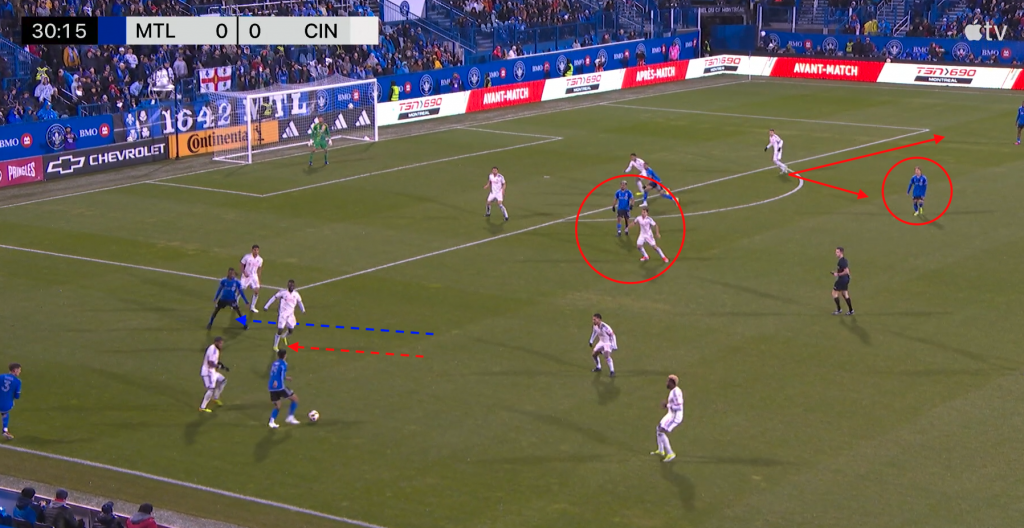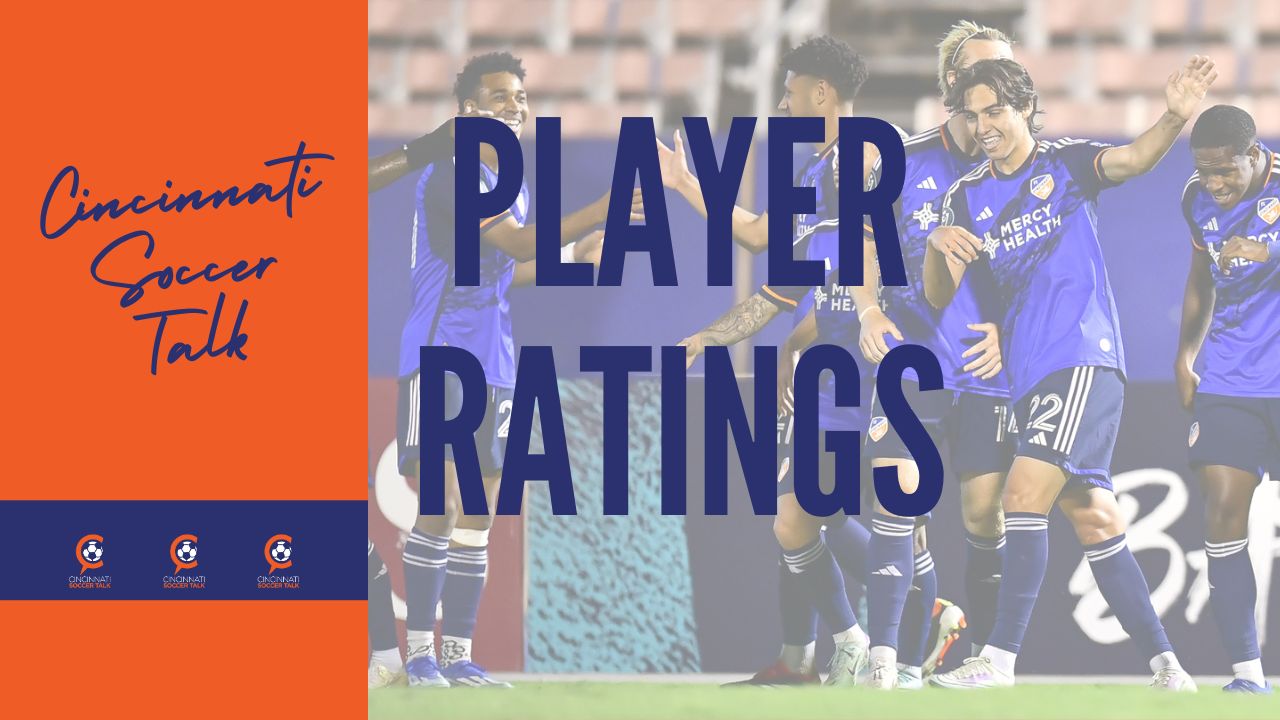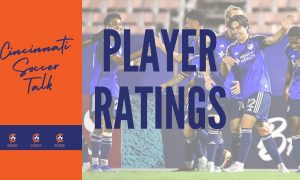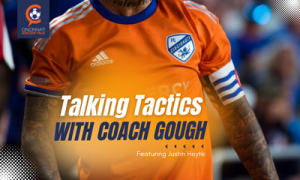FC Cincinnati had the… pleasure… of being the opponent of CF Montreal as they opened their stadium after starting the season with a long road trip, and the Orange and Blue simply couldn’t play the foil. Yuya Kubo scored for the second game on the bounce, but it wasn’t enough as Club de Foot scored two goals in transition to grab the win and continue FCC’s winless run, now at three matches on the trot.
Let’s look at where your favorite FCC players ranked for this match.
Check out Cincinnati Soccer Talk’s post-match report HERE for more details.
RULES:
- Each player starts off with a six as a standard rating. Six signifies an “average performance” for the match.
- Players will receive additions or subtractions to their score based on individual moments and the overall team performance.
- We’ll look at multiple criteria and statistics from websites like FB Ref, Who Scored and FOTMOB.
- All statistics used will be taken from fbref.com when possible.
- A player may receive a N/A if they are subbed on/off before any quantifiable statistics are available.
Expected Goals (xG): FC Cincinnati – 1.04, CF Montreal – 1.12, per fotmob.com
Formation: 3-5-2
Now, onto the ratings:
Manager – Pat Noonan – 5.5
Any time your team loses, it is going to be tough for you to earn more than the “average” score of 6 as a manager. So, let’s talk about why Noonan might have deserved that score. First off, it appears that the gaffer took Lucho Acosta off of corner kick duty. And, while Luca Orellano didn’t fare much better in that department, I think I speak for many of you when I say we couldn’t bear any more Acosta corners that hit the first defender or the near side-netting as he attempted yet another Olimpico. Second, I think Noonan intentionally asked Pavel Bucha to play a more active role in the offense. And, while it didn’t directly lead to any goals, he helped to set up one gilt-edged chance and played a part in the build-up to his side’s only goal.
Now, let’s talk about why I scored Noonan where I did. For me, like Mike below, this is all about substitutions.
Sorry for the spoiler, but we are 66 minutes into a dreadful performance and have made no subs. This is hard to understand.
— Mike Prentiss (@mwprentiss) April 14, 2024
As Mike stated, in a match where his team looked outpaced, outmanned and out of sorts, Noonan didn’t make his first substitute until the 72nd minute. Then, he brought in Dado Valenzuela just six minutes later meaning that he used two windows when one would have sufficed. In the end, Noonan only ended up making four of his allotted five changes.
GK – Alec Kann – 5.5
Do you believe the stats, or do you believe your eyes? Neither of the CF Montreal goals that Kann gave up looked particularly saveable. However, their PSxG was just 0.37 and 0.28, respectively, which indicates they absolutely were. Maybe Kann needed better footwork and anticipation on the first. Maybe he needed quicker reflexes on the second. Either way, he gave up two goals on a total PSxG of just 0.8, which means he was negative overall in the shot-stopping department.
Kann looked pretty decent in possession, which was a noticeable difference from both Evan Louro and Roman Celentano. Overall, I don’t think he did a lot to hurt his chances to start the next match, even if he didn’t cement himself as the locked-in second-choice goalkeeper.
RWB – DeAndre Yedlin – 4.5
DeAndre Yedlin typically doesn’t add enough going forward to be a truly effective right wingback. This match was no exception, as he didn’t log a shot-creating action, a cross or a pass into the penalty area. His one progressive action (a carry) was far from enough to consider him an effective force progressing the ball, and his three progressive receptions were half of his per-90 average.
Typically, we can overlook his lack of offensive thrust because he is pretty excellent defensively. However, in this match, he was dribbled three times. One of those times was by a center back, Joaquin Sosa, who had wandered forward into the attack. Sosa beat Yedlin with a simple cut-move that created a dangerous moment in transition. One thing you can never fault Yedlin for is his effort, and in this match, he led the team with five tackles, even though he won possession with only two of them.
RCB – Miles Robinson – 5.5
Miles Robinson continued his concerning run of lackluster performances in this match. He wasn’t terrible by any stretch of the imagination. In fact, he was one of the only center backs that acquitted himself well in possession, logging four progressive passes and four passes into the final third while maintaining a decent overall passing percentage (88.3 percent).
However, the entire back line struggled all night trying to determine who was to cover which Montreal forward that was dropping off the back line to connect. Miles had the fewest recoveries of any of the center backs with three while logging only one each of tackles, blocks, and interceptions. To make matters worse, he was dribbled once and shares a bit of the blame for allowing Ariel Lassiter to score the game-winning goal (see Bucha below).
CB – Matt Miazga – 5
Matt Miazga had the worst performance of his FCC career in this match, outside of off-field incidents. He was woeful in possession, logging a far-too-low 77.5 percent passing that included moments like at the 14th-minute mark when he played the ball straight out of bounds trying to find Yedlin on the touchline. In the end, he only completed four of his 11 long pass attempts.
Furthermore, as the central defender and de facto captain of the defense, it is Miazga’s responsibility to get his central defenders organized. And, as mentioned above, they were not. Miazga’s lone saving grace was his three blocked shots, which were needed in large part due to the defense’s disorganization. I expect Matt to bounce back with a vengance after watching the film of this match.
LCB – Ian Murphy – 4
Ian Murphy was at odds with himself all match, not knowing whether to “stick or twist,” as they say. He fell asleep in the 10th minute, allowing right back Ruan to get behind him and rattle the far post with a shot. Then, it looked to me as if he grabbed the lion’s share of the blame for Montreal’s opening goal when he followed the run of Lassiter when it appeared that Miazga was trying to get him to pick up Josef, as seen in this video:
Le premier but au Stade Saputo de Josef Martínez 💪
Josef Martínez scores our first goal against FC Cincinnati🚀#CFMTL pic.twitter.com/OYtN7jWTiw
— CF Montréal (@cfmontreal) April 14, 2024
Murphy led the team in fouls with three, recorded zero progressive passes and his only defensive stat was a blocked shot. He also got badly turned in the open field by Bryce Duke and had to grab the attacker, earning a yellow card. Murphy did have a shot-creating action and a key pass, however, so I guess that’s something. I remain a Murphy believer, but I think he has a lot of work to do to figure out how and when to mark attackers that play within fluid offenses.
LWB – Luca Orellano – 6.5
Luca Orellano is trying to make things happen. In this match, he led the team with 11 progressive receptions and tied for the lead with seven progressive carries. He also led the team in attempted dribbles, a stat line that is nearly always Lucho Acosta’s, and also contributed eight crosses. However, the young Argentinian continues not to have much to show for his efforts. For all his ball progression, he still managed only 70.5 percent passing, including completing a mere one of seven long balls. Out of his six dribble attempts, he only completed three. Finally, only two of his eight crosses found a target. Emblematic of his lack of end product was the moment in the sixth minute when he blazed a shot well over the bar from a poor angle when he had targets in the box to aim for, ending a promising counterattack.
Defensively, Orellano is further along in his progression than Álvaro Barreal was at this stage in his MLS career. Luca had two tackles, winning possession on both. He also led the team with seven ground duels won. He did, however, commit a bad tackle in the 18th minute, earning himself a yellow card while giving away a free kick in a dangerous area.
DCM – Pavel Bucha – 7.5 (Man of the Match)
I have to be honest with this one: I wrestled over whether to give Bucha my man-of-the-match award. I mentioned on this week’s Talking Tactics that I loved how involved he was in the offense. He was more involved in the attacking third in this match than he’s been all season. He had a lovely pass to send Acosta through in the 53rd minute, setting up a great chance for Kubo. He ended the match with three shot-creating actions. Even with his more advanced role, however, he also contributed in a major way in ball progression. Not only did he tie for the team lead with five progressive passes, he added two progressive carries while leading the team with a 92.3 percent passing rate.
Bucha’s defensive stats were also pretty impressive, considering his more attacking role. He logged three tackles and an interception and also led the team with 10 ball recoveries. So, where did my trepidation in naming him man-of-the-match come from? Bucha’s defensive shifting was a problem all night. He often failed to drop back defensively when Obi Nwobodo pushed forward, allowing Montreal midfielders to get behind the FCC midfield unit time after time. This played a part in both goals. Just watch how Bucha fell asleep in the transition leading to the game-winner, allowing Lassiter to run by him en route to scoring his banger:
Le but gagnant ⚽️
Tonight’s winning goal by Ariel Lassiter 👊#CFMTL pic.twitter.com/uqGuHVQTS8
— CF Montréal (@cfmontreal) April 14, 2024
This team needs Pavel Bucha to be part of the offense if it is to start scoring goals at anything resembling a championship rate. However, it can’t be at the expense of rest defense or allowing huge transition opportunities. Whether that means Bucha flawlessly shifting forward and backward or Obi simply sitting as a more traditional #6, Pat Noonan will have to decide.
DCM – Obi Nwobodo – 4
“Obinna Nwobodo just doesn’t look right.”
That is a quote that I could attribute to a bunch of different fans. It is so odd to see FCC’s holding midfielder, whom we often hold up as one of the best in the league, look so helpless. To my eye test, he doesn’t look slower or off the pace. I just feel like he is constantly chasing the ball and getting out of position. And the numbers back up the fact that he is chasing the game to no avail. In this match, Obi had only three ball recoveries and didn’t log a tackle. He averages nearly six and nearly four, respectively. He also only got into two ground duels. That means he wasn’t close enough to the ball on most occasions to make an impact. This photo sums up his undisciplined ball-chasing:

As Raheem Edwards makes a run to the corner (blue arrow), Obi leaves the midfield to follow, creating a huge passing window. That meant that Bucha was left to figure out whether to deny Josef Martinez the entry pass or stay in the passing window to deny Bryce Duke the cross-field ball (both circled in red). The cascading effect of this was that Orellano had both Duke and Ruan to cover on the weak side. This is one example of a problem that happened all night.
Obi also wasn’t great in possession. His 81 percent passing was a fine rate, but he didn’t log a key pass or a pass into the final third and added only two progressive passes in total. That means he was passing mostly sideways and backward. Obi did, however, somehow log four interceptions.
CAM – Luciano Acosta – 7
For all the talk of Lucho Acosta playing hero ball, he was rather calm in this match. I mentioned above how he didn’t lead the team in attempted dribbles. He still managed to lead them in shot-creating actions with four. His 58th-minute assist was a moment of calmness where he didn’t overthink things and simply turned and played Kubo in on goal. Lucho also added 12 progressive actions (five passes, seven carries). However, Montreal was able to effectively limit Lucho from receiving the ball between the lines. He logged only two progressive receptions while he averages over six per 90 minutes. He also wasn’t clean on the ball, tallying five mistouches and being dispossessed once.
After watching this match, my question is: Did Montreal effectively limit Lucho’s production or is he just tired? Supporting the latter conclusion was his lack of defensive contribution. Lucho is usually the player that keys FCC’s press. Because of this, he usually racks up recoveries, tackles and even fouls. In this match, he logged only one recovery, while failing to log a tackle or interception. He did, however, win four of his eight ground duels.
ST – Yuya Kubo – 7.5
Justin Hoyte and I talked on Talking Tactics last week about Yuya Kubo’s movement being the best thing that he is bringing to the FCC front line. His slightly curled run off the shoulder of the defender to score his goal is a perfect example:
Needed this. Need another one. pic.twitter.com/eQ8LIwrhNN
— FC Cincinnati (@fccincinnati) April 14, 2024
It is a small thing, but players like Baird, Boupendza and Santos have all been in that position and stood still, waiting on Lucho’s pass before trying to make the run. This means that the defender gets to run even with them and narrow their angle or block their shot. Yuya’s run wasn’t direct, so he stayed onside. His finish was also pretty classy. Kubo also took up good positions throughout the match, coming in second on the team with four progressive receptions. Finally, he wasn’t dispossessed and didn’t have a mistouch.
So, why isn’t Kubo man-of-the-match? Even though he scored the game’s only goal, he also had the biggest missed chance in the 53rd minute when Lucho found him with a cutback and he sent his shot straight at the goalkeeper. Futhermore, he attempted three dribbles and didn’t complete any of them. Lastly, and most incredibly, he managed only 13 offensive third touches. That was fewer than Pavel Bucha and only two more than late-game substitute Dado Valenzuela.
ST – Aaron Boupendza – 2
I really wish I could rate Aaron Boupendza “N/A,” even though he played 71 minutes. His lack of involvement isn’t entirely his fault, as it seems like his teammates don’t always spot him when he’s open. However, the DP #9 had only five attacking third touches on the night, tying him for eighth place on the team with center back Miles Robinson. Consequently, Boup had no shot-creating actions. His lone shot was so tame it was logged at zero xG (rounding down from its paltry 0.02).
Part of me wonders whether Boupendza’s teammates aren’t passing him the ball because he takes so little care of it. In this match, his 62.5 percent passing was the worst on the team. He didn’t complete either of his two dribble attempts. Lastly, he added three mistouches, which is three too many when you are touching the ball so few times. So why did I rate him a “2?” I gave him a full point for his excellent turn in the 29th minute that left center back Joel Waterman in his wake and another full point for the yellow card that Waterman picked up on the play. Call me generous.
SUBS
Corey Baird (72nd minute) – 3
Corey Baird had only five touches in 19 minutes, plus stoppage time, of play. One of those five touches was a mistouch. He completed only two of his three passes. Furthermore, in a match where his team needed to win the ball back and score, he got into only one ground duel and one aerial duel. His only defensive stat was a blocked pass. Baird’s best role is not as a starter on this team. He is going to have to figure out how to provide a spark off the bench if he is to play any role at all.
Nick Hagglund (72nd minute) – 6
The Cincinnati Kid entered the match when his team was already trailing 2-1. Therefore, he had very little to do on the defensive side of the ball. He was able to grab two interceptions to win possession back for his team. In terms of offense, he added two progressive passes which is a good tally for his limited minutes. However, he wasn’t able to tally a pass into the final third.
Gerardo Valenzuela (78th minute) – 6.5
Dado Valenzuela looked crisp on the ball and worked hard defensively in his limited minutes. He had an impressive 11 attacking third touches despite playing so little. Before you stand up to clamor for additional playing time for the academy product, however, keep in mind that he wasn’t able to add a shot-creating action and had only one pass into the penalty area with those touches. He also had two mistouches. Overall, I think Dado deserves more time, but he probably isn’t a full-time starter just yet.
Sergio Santos (89th minute) – N/A
Availability Notes: Roman Celentano (ankle)
DEFINITIONS:
- xG – Expected goals (or xG) measures the quality of a chance by calculating the likelihood that it will be scored from a particular position on the pitch during a particular phase of play
- xA – Expected assist (or xA) is directly related to the xG of a shot that the pass creates.
- Post-Shot xG (PSxG) – Post-Shot xG is calculated after the shot has been taken, once it is known that the shot is on-target, taking into account the quality of the shot.
- Progressive Pass – A pass that advances toward the opponent’s goal where the distance between the starting point and the next touch is:
- at least 30 meters closer to the opponent’s goal if the starting and finishing points are within a team’s own half
- at least 15 meters closer to the opponent’s goal if the starting and finishing points are in different halves
- at least 10 meters closer to the opponent’s goal if the starting and finishing points are in the opponent’s half
- Progressive Carry – Carries that move the ball toward the opponent’s goal at least 5 yards or any carry into the penalty area. Excludes carries from the defending 40% of the pitch.
- Dribble – Moving past the opposing player while maintaining possession of the ball. When a player shields the ball or otherwise uses physical strength to maintain possession, this is not a dribble.
- Key Pass – A pass that immediately creates a clear goal scoring opportunity for a teammate. A key pass does not have to lead to a shot, and thus is different than a shot-creating action.
- Long Pass – Definition depends on the site being used. Typically, a pass that travels a distance greater than 30 yards.
- Mistouch – When a player fails when trying to gain control of the ball without a defender earning a tackle or a ground duel.
- Ground Duel – A challenge between two players to gain control of the ball, progress with the ball, or change its direction.
- Dispossessed – The times a player loses control of the ball after a tackle from an opponent, not including attempted dribbles.
- Recovery – Any action that ends the possession of the opponent without the ball going out of bounds. Recoveries are typically duels (44%) or interceptions (16%), but can happen without any specific action from the player doing the recovery (positioning himself correctly or simply collecting the ball).













